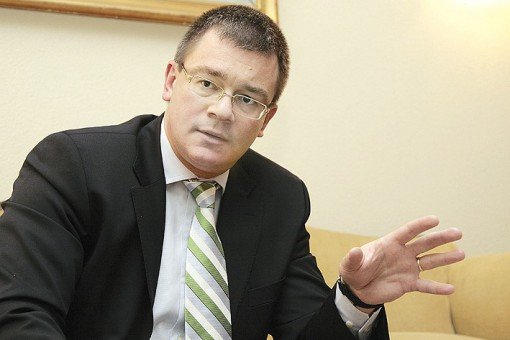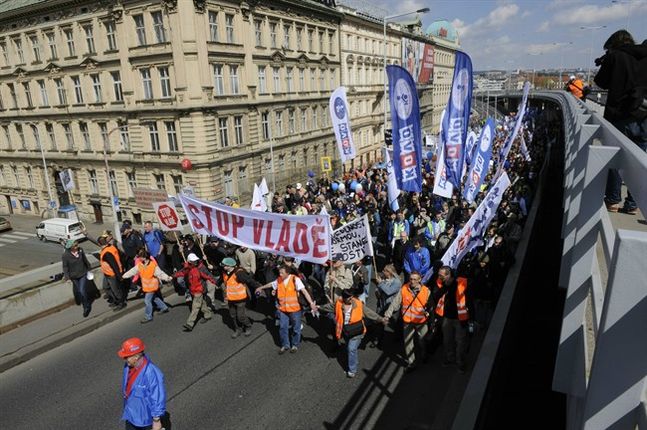Home Tags Posts tagged with "fall of communism"
fall of communism
Prague’s international airport has been renamed after former Czech President Vaclav Havel, who died last year.
The ribbon-cutting ceremony attended by dignitaries and family took place on what would have been his 76th birthday.
More than 80,000 people signed a petition calling for the name change to honor the dissident playwright.
Foreign Minister Karel Schwarzenberg said he hoped every Czech air passenger leaving Prague would think of the man to whom they owed their freedom.
“This is the right place [to bear Vaclav Havel’s name] – it was he who enabled the Czech nation to travel out of this country,” he added.
Vaclav Havel led the peaceful 1989 overthrow of communism in then Soviet-backed Czechoslovakia.
“November 1989 was possible only because of Vaclav Havel,” said Karel Schwarzenberg.
A line of dignitaries including the former president’s widow Dagmar Havlova cut the small strip of airport tape to mark the renaming.
Dagmar Havlova said: “To me, today’s ceremony is proof of recognition of President Vaclav Havel, a recognition of freedom and democracy in our country, a recognition of his acts for this country. Ladies and gentlemen, welcome to the Vaclav Havel Airport Prague.”
The airport – one of the busiest transport hubs in central Europe – was formerly known as Ruzyne airport.
Vaclav Havel became president of Czechoslovakia in 1989 after the fall of communism. When Slovakia split in 1993, he remained Czech leader until 2003.
Vaclav Havel died last December after having suffered from respiratory problems for many years.
Romania’s centre-right government led by PM Mihai Razvan Ungureanu lost a confidence vote today after 78 days of governing.
The no-confidence bill was filed by the liberal and centre-left opposition (USL) and won 235 votes in the 471-seat chamber, while the government was backed by only got 9 lawmakers. It is for the second time parliament has dismissed a government since the fall of Communism in 1989.

Romania's centre-right government lead by PM Mihai Razvan Ungureanu lost a confidence vote today after 78 days of governing
The issue at stake were cuts to wages and pensions aimed at scrapping some of the imbalances in the system and requested by the International Monetary Fund (IMF).
President Traian Basescu will nominate a new prime minister who must then win parliament’s approval.
Opposition leader Victor Ponta welcomed the vote saying it marked the end of “an abusive system that uses any weapon possible”.
“Today there was justice,” he said.
Anti-government protesters in the Czech Republic have staged what they describe as the biggest rally since the fall of communism in 1989.
Demonstrators say 120,000 people packed the capital Prague, protesting against austerity measures and corruption. Police put the numbers at 90,000.
Echoing 1989, people jangled their keys – a signal to the centre-right coalition cabinet to lock up and leave.
The government has recently been rocked by splits and defections.
It is no longer clear if the coalition of Prime Minister Petr Necas commands a majority in parliament.

Anti-government protesters in the Czech Republic have staged what they describe as the biggest rally since the fall of communism in 1989
On Saturday, the protesters – including many pensioners and students – marched through Prague, gathering in Wenceslas Square – the heart of the capital.
Chanting and whistling, they carried banners which read “Stop thieves!” and “Away with the government!”
Rene Koncilova, one of the marchers, said she was struggling to survive on her monthly $350 disability pension.
“Vaclav Klaus [current president] told us in 1989 that we had to tighten our belts, and the country became anorexic,” she said.
“Fortunately, doctors managed to cure it, but now they’re asking us to tighten our belts again. I think we’ll all be anorexic before long.”
Czech government says there is no alternative to cuts in public spending and tax rises if the country is to avoid the fate of debt-ridden Greece.
[youtube qsf4ZJvOJes]
Václav Havel, the former Czech president and dissident playwright, who wove theater into politics to peacefully bring down communism in Czechoslovakia and become a hero of the epic struggle that ended the Cold War, has died at 75.
His assistant Sabina Dancecova says Václav Havel died Sunday morning at his weekend house in the northern Czech Republic.
Václav Havel was his country’s first democratically elected president after the nonviolent “Velvet Revolution” that ended four decades of repression by a regime he ridiculed as “Absurdistan.”
As president, Václav Havel oversaw the country’s bumpy transition to democracy and a free-market economy, as well its peaceful 1993 breakup into the Czech Republic and Slovakia.

Václav Havel, the former Czech president and dissident playwright, has died at 75
One of the leading intellectual figures and moral forces in Eastern Europe, Václav Havel was elected President of the Czech and Slovak Federal Republic in 1989 and in 1993 President of the newly formed Czech Republic.
Václav Havel’s role as a public figure has now somewhat overshadowed his record as a dramatist and political essayist. His work often dealt with the power of language to interfere with clear thought.
Václav Havel was born into a well-to-do family in Prague. His father owned Prague’s cliff-top Barrandov suburb and his mother, Bozena Havlova, the daughter of an ambassador and journalist, encouraged her son’s intellectual and artistic ambitions.
Václav Havel supported the Prague Spring reform movement of 1968, though he did not play a major role. After it was crushed by Soviet-led Warsaw Pact forces in August, Václav Havel took on a more visible role in activism.
During the 1970s and 1980’s Václav Havel was repeatedly arrested, serving several years in prison for his dissident activities (1977, 1978-79, 1979-83, 1989).
After the communist regime sentenced Václav Havel in 1979 to 4 1/2 years in prison for subversion, he was given the opportunity to emigrate, but he chose imprisonment. In the 1980s Václav Havel became the undisputed unofficial leader of the Czechoslovak human rights movement. In November 1989 he formed a new opposition group, Civic Forum, but it was students, who began the “Velvet Revolution.” Following the fall of communism, Alexander Dubcek (1921-1992), who had launched a series of reforms in 1968 and was subsequently expelled from the Presidium, was elected chairman of the parliament. Václav Havel was elected in 1989 by direct popular vote President of the Czech and Slovak Federal Republic, following Gustav Husák.



